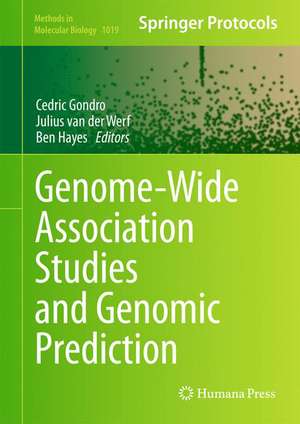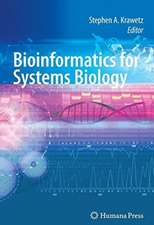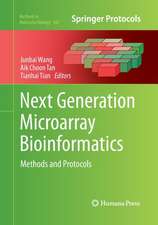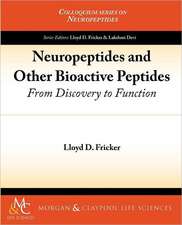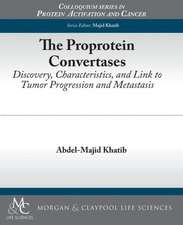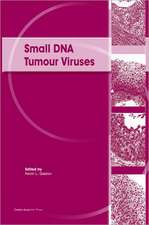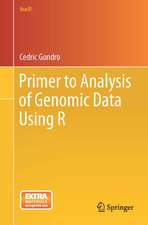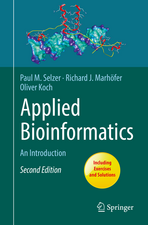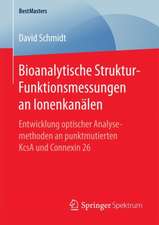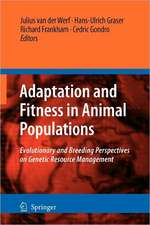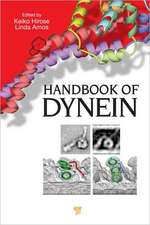Genome-Wide Association Studies and Genomic Prediction: Methods in Molecular Biology, cartea 1019
Editat de Cedric Gondro, Julius van der Werf, Ben Hayesen Limba Engleză Hardback – 12 iun 2013
| Toate formatele și edițiile | Preț | Express |
|---|---|---|
| Paperback (1) | 1007.94 lei 6-8 săpt. | |
| Humana Press Inc. – 30 apr 2017 | 1007.94 lei 6-8 săpt. | |
| Hardback (1) | 1640.85 lei 6-8 săpt. | |
| Humana Press Inc. – 12 iun 2013 | 1640.85 lei 6-8 săpt. |
Din seria Methods in Molecular Biology
- 9%
 Preț: 791.63 lei
Preț: 791.63 lei - 23%
 Preț: 598.58 lei
Preț: 598.58 lei - 20%
 Preț: 882.98 lei
Preț: 882.98 lei -
 Preț: 252.05 lei
Preț: 252.05 lei - 5%
 Preț: 802.70 lei
Preț: 802.70 lei - 5%
 Preț: 729.61 lei
Preț: 729.61 lei - 5%
 Preț: 731.43 lei
Preț: 731.43 lei - 5%
 Preț: 741.30 lei
Preț: 741.30 lei - 5%
 Preț: 747.16 lei
Preț: 747.16 lei - 15%
 Preț: 663.45 lei
Preț: 663.45 lei - 18%
 Preț: 1025.34 lei
Preț: 1025.34 lei - 5%
 Preț: 734.57 lei
Preț: 734.57 lei - 18%
 Preț: 914.20 lei
Preț: 914.20 lei - 15%
 Preț: 664.61 lei
Preț: 664.61 lei - 15%
 Preț: 654.12 lei
Preț: 654.12 lei - 18%
 Preț: 1414.74 lei
Preț: 1414.74 lei - 5%
 Preț: 742.60 lei
Preț: 742.60 lei - 20%
 Preț: 821.65 lei
Preț: 821.65 lei - 18%
 Preț: 972.30 lei
Preț: 972.30 lei - 15%
 Preț: 660.49 lei
Preț: 660.49 lei - 5%
 Preț: 738.41 lei
Preț: 738.41 lei - 18%
 Preț: 984.92 lei
Preț: 984.92 lei - 5%
 Preț: 733.29 lei
Preț: 733.29 lei -
 Preț: 392.60 lei
Preț: 392.60 lei - 5%
 Preț: 746.26 lei
Preț: 746.26 lei - 18%
 Preț: 962.66 lei
Preț: 962.66 lei - 23%
 Preț: 860.22 lei
Preț: 860.22 lei - 15%
 Preț: 652.64 lei
Preț: 652.64 lei - 5%
 Preț: 1055.50 lei
Preț: 1055.50 lei - 23%
 Preț: 883.87 lei
Preț: 883.87 lei - 19%
 Preț: 491.89 lei
Preț: 491.89 lei - 5%
 Preț: 1038.86 lei
Preț: 1038.86 lei - 5%
 Preț: 524.16 lei
Preț: 524.16 lei - 18%
 Preț: 2122.34 lei
Preț: 2122.34 lei - 5%
 Preț: 1299.23 lei
Preț: 1299.23 lei - 5%
 Preț: 1339.12 lei
Preț: 1339.12 lei - 18%
 Preț: 1390.26 lei
Preț: 1390.26 lei - 18%
 Preț: 1395.63 lei
Preț: 1395.63 lei - 18%
 Preț: 1129.65 lei
Preț: 1129.65 lei - 18%
 Preț: 1408.26 lei
Preț: 1408.26 lei - 18%
 Preț: 1124.92 lei
Preț: 1124.92 lei - 18%
 Preț: 966.27 lei
Preț: 966.27 lei - 5%
 Preț: 1299.99 lei
Preț: 1299.99 lei - 5%
 Preț: 1108.51 lei
Preț: 1108.51 lei - 5%
 Preț: 983.76 lei
Preț: 983.76 lei - 5%
 Preț: 728.16 lei
Preț: 728.16 lei - 18%
 Preț: 1118.62 lei
Preț: 1118.62 lei - 18%
 Preț: 955.25 lei
Preț: 955.25 lei - 5%
 Preț: 1035.62 lei
Preț: 1035.62 lei - 18%
 Preț: 1400.35 lei
Preț: 1400.35 lei
Preț: 1640.85 lei
Preț vechi: 2051.06 lei
-20% Nou
Puncte Express: 2461
Preț estimativ în valută:
313.99€ • 335.75$ • 261.79£
313.99€ • 335.75$ • 261.79£
Carte tipărită la comandă
Livrare economică 18 aprilie-02 mai
Preluare comenzi: 021 569.72.76
Specificații
ISBN-13: 9781627034463
ISBN-10: 1627034463
Pagini: 515
Ilustrații: XI, 566 p. 67 illus., 31 illus. in color. With online files/update.
Dimensiuni: 178 x 254 x 38 mm
Greutate: 1.18 kg
Ediția:2013
Editura: Humana Press Inc.
Colecția Humana
Seria Methods in Molecular Biology
Locul publicării:Totowa, NJ, United States
ISBN-10: 1627034463
Pagini: 515
Ilustrații: XI, 566 p. 67 illus., 31 illus. in color. With online files/update.
Dimensiuni: 178 x 254 x 38 mm
Greutate: 1.18 kg
Ediția:2013
Editura: Humana Press Inc.
Colecția Humana
Seria Methods in Molecular Biology
Locul publicării:Totowa, NJ, United States
Public țintă
Professional/practitionerCuprins
R for Genome-Wide Association Studies.- Descriptive Statistics of Data: Understanding the Data Set and Phenotypes of Interest.- Designing a Genome-Wide Association Studies (GWAS): Power, Sample Size, and Data Structure.- Managing Large SNP Datasets with SNPpy.- Quality Control for Genome-Wide Association Studies.- Overview of Statistical Methods for Genome-Wide Association Studies (GWAS).- Statistical Analysis of Genomic Data.- Using PLINK for Genome-Wide Association Studies (GWAS) and Data Analysis.- Genome-Wide Complex Trait Analysis (GCTA): Methods, Data Analyses, and Interpretations.- Bayesian Methods Applied to Genome-Wide Association Studies (GWAS).- Implementing a QTL Detection Study (GWAS) Using Genomic Prediction Methodology.- Genome-Enabled Prediction Using the BLR (Bayesian Linear Regression) R-Package.- Genomic Best Linear Unbiased Prediction (gBLUP) for the Estimation of Genomic Breeding Values.- Detecting Regions of Homozygosity to Map the Cause of Recessively Inherited Disease.- Use of Ancestral Haplotypes in Genome-Wide Association Studies.- Genotype Phasing in Populations of Closely Related Individuals.- Genotype Imputation to Increase Sample Size in Pedigreed Populations.- Validation of Genome-Wide Association Studies (GWAS) Results.- Detection of Signatures of Selection Using FST.- Association Weight Matrix: A Network-Based Approach Towards Functional Genome-Wide Association Studies.- Mixed Effects Structural Equation Models and Phenotypic Causal Networks.- Epistasis, Complexity, and Multifactor Dimensionality Reduction.- Applications of Multifactor Dimensionality Reduction to Genome-Wide Data Using the R Package ‘MDR’.- Higher Order Interactions:Detection of Epistasis Using Machine Learning and Evolutionary Computation.- Incorporating Prior Knowledge to Increase the Power of Genome-Wide Association Studies.- Genomic Selection in Animal Breeding Programs.
Recenzii
From the reviews:
“A detailed review that will help both genomics newbies and experts to have a better picture of what their genome sequences can offer them today. … People working in medicine and health sciences should read this book and get involved in the field. … anyone unfamiliar with the topic, but with the desire to learn more about what they could find in their own genome, can start learning from scratch by reading this book.” (Alejandra Manjarrez, Lab Times, Issue 5, September, 2013)
“A practical guide for experts to obtain, qualify, and statistically analyse data on genomes and to support genotype-phenotype information. In a growing field, this is the first hands-on book for experts in a relatively new discipline. … the book is too good to ignore once you start reading and pick up information along the way. … if you are new to the field, this book will certainly extend you a warm welcome to the tricky world of GWAS.” (Vijay Shankar, Lab Times, Issue 6, 2013)
“A detailed review that will help both genomics newbies and experts to have a better picture of what their genome sequences can offer them today. … People working in medicine and health sciences should read this book and get involved in the field. … anyone unfamiliar with the topic, but with the desire to learn more about what they could find in their own genome, can start learning from scratch by reading this book.” (Alejandra Manjarrez, Lab Times, Issue 5, September, 2013)
“A practical guide for experts to obtain, qualify, and statistically analyse data on genomes and to support genotype-phenotype information. In a growing field, this is the first hands-on book for experts in a relatively new discipline. … the book is too good to ignore once you start reading and pick up information along the way. … if you are new to the field, this book will certainly extend you a warm welcome to the tricky world of GWAS.” (Vijay Shankar, Lab Times, Issue 6, 2013)
Textul de pe ultima copertă
With the detailed genomic information that is now becoming available, we have a plethora of data that allows researchers to address questions in a variety of areas. Genome-wide association studies (GWAS) have become a vital approach to identify candidate regions associated with complex diseases in human medicine, production traits in agriculture, and variation in wild populations. Genomic prediction goes a step further, attempting to predict phenotypic variation in these traits from genomic information. Genome-Wide Association Studies and Genomic Prediction pulls together expert contributions to address this important area of study. The volume begins with a section covering the phenotypes of interest as well as design issues for GWAS, then moves on to discuss efficient computational methods to store and handle large datasets, quality control measures, phasing, haplotype inference, and imputation. Later chapters deal with statistical approaches to data analysis where the experimental objective is either to confirm the biology by identifying genomic regions associated to a trait or to use the data to make genomic predictions about a future phenotypic outcome (e.g. predict onset of disease). As part of the Methods in Molecular Biology series, chapters provide helpful, real-world implementation advice.
Caracteristici
Examines genome-wide association studies, from the preliminary issues to statistical approaches and more Features detailed, step-by-step instruction Includes tips and expert implementation advice to ensure successful results
